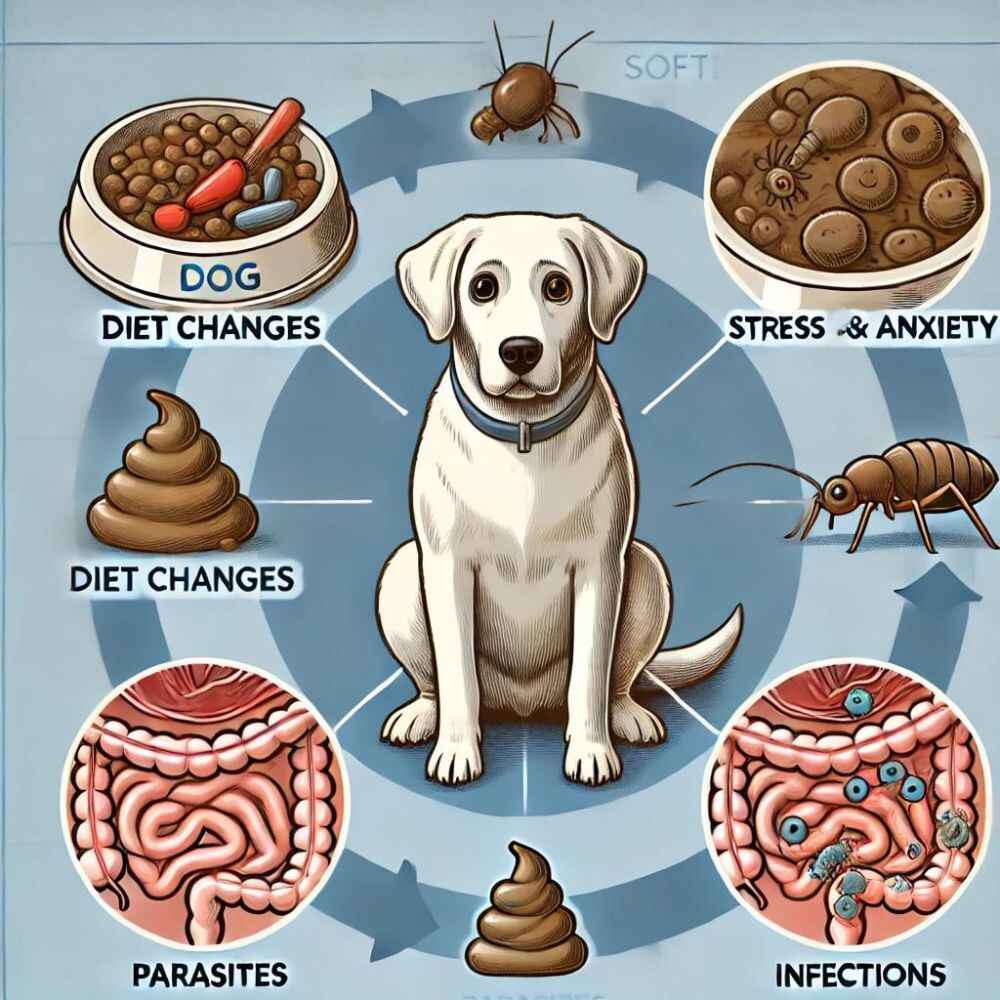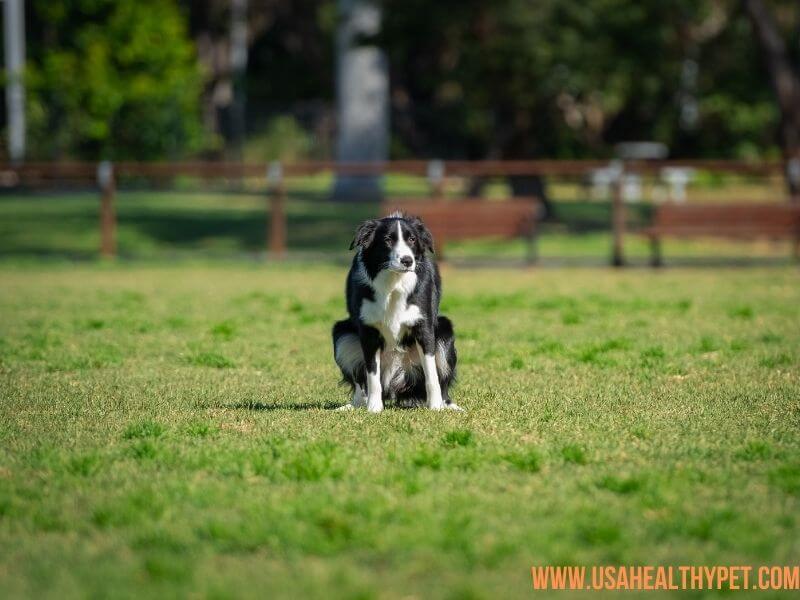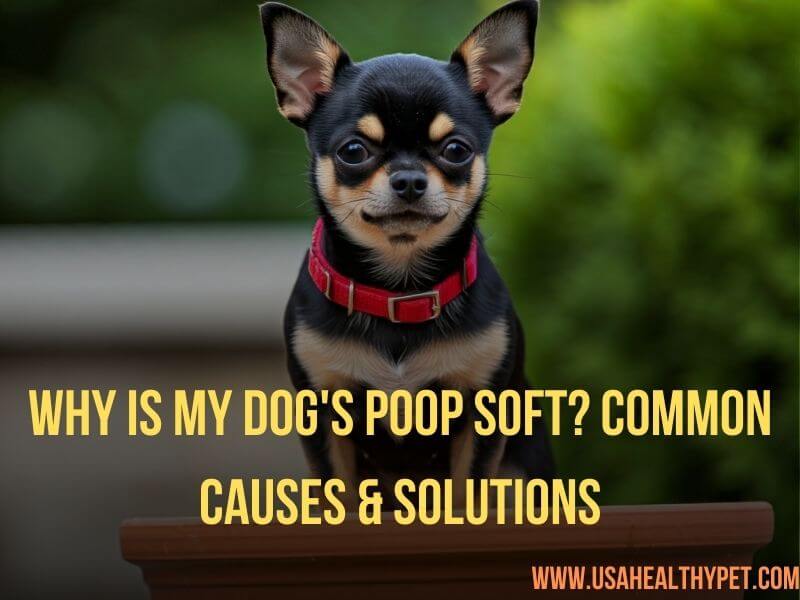If you’ve noticed that your dog’s poop is softer than usual, you’re probably wondering what’s going on. It’s something every dog owner experiences at some point, and it’s important to understand why it happens and when it’s a sign that something’s wrong.
Soft stools are common, especially in puppies, but there are several reasons why it happens, and some may need your attention.
Let’s explore why your dog or puppy’s poop is soft and what to do about it.
What Is Soft Poop in Dogs and Puppies?
Soft poop is when your dog’s or puppy’s stool doesn’t hold its usual firm shape. It can range from a little mushy to almost watery, though it’s not quite diarrhea.
If your dog’s poop is soft for more than a day or two, or if you notice this consistently, it’s a sign that something in their digestive system might be off.
Why Does My Dog Have Soft Poo?
Now, let’s explore why your dog’s poop might be soft. There are several reasons, and most of them are pretty common.

1. Diet Changes
Have you switched your dog’s food recently? If so, that’s a likely culprit. Just like us, dogs need time to adjust to new foods. A sudden change can upset their digestive system, leading to soft stools.
Even small changes like adding a new treat or switching to a different protein source can have this effect.
2. Food Intolerance or Sensitivity
Your dog might not agree with certain ingredients in its food. Common culprits include grains, certain proteins (like chicken or beef), or even additives.
Just like how some people can’t tolerate lactose or gluten, dogs can have their own sensitivities, which can lead to stomach upset and softer poop.
3. Stress and Anxiety
Believe it or not, your dog’s emotional state can affect its digestive health. If your dog has been through a stressful event—like a move, a new family member, or even fireworks—it might lead to softer stools.
Stress affects dogs similarly to how it affects people, leading to changes in gut function.
Dr. Karen Becker, a holistic veterinarian, notes that “when dogs are anxious, their digestive system reacts by speeding up the process of moving food through the intestines, leading to softer stools.”
4. Parasites
Parasites such as worms or giardia can lurk in your dog’s intestines, disrupt digestion, and cause soft or runny stools. Parasites can be picked up from contaminated water, soil, or other dogs, and they’re more common than you might think.
If your dog has soft poop for more than a few days, it’s worth checking with a vet to rule out parasites.
Parasites are another major concern, particularly in puppies. The American Kennel Club (AKC) suggests regular fecal exams, as “many parasites like giardia or roundworms can be easily treated if caught early, preventing prolonged digestive issues.”
5. Infections
Bacterial or viral infections can mess with your dog’s digestive system, often leading to diarrhea or soft stools. Common infections include things like salmonella or parvovirus.
Usually, these infections come with other symptoms like vomiting, lethargy, or fever, so keep an eye out for any additional signs.
6. Overeating
Sometimes, soft poop is simply a sign that your dog is eating too much.
If your dog’s meals are a little too generous, it can overwhelm their digestive system, resulting in less-than-firm stools. Keeping portions consistent is crucial for healthy digestion.

7. Dehydration
Hydration plays a big role in keeping poop firm. If your dog isn’t drinking enough water, its digestive system might not be able to process food properly, leading to soft, dry, or crumbly poop.
Always make sure your dog has access to fresh water, especially on hot days or after exercise.
Is Soft Puppy Poop Normal?
Puppies often experience soft poop as their digestive systems are still developing. It’s quite normal for puppies to have soft stools occasionally, especially if they’re transitioning to solid foods or exploring new treats.
However, if your puppy’s poop is consistently soft or they seem unwell, it’s a good idea to consult with your vet to make sure there’s no underlying issue.
When Should You Be Concerned?
Soft poop here and there is usually no big deal, but when should you start worrying? If the soft stools persist for more than a couple of days, especially if they’re accompanied by other symptoms like vomiting, lethargy, or blood in the stool, it’s time to see the vet.
Consistent soft poop could be a sign of a more serious issue, like a chronic condition or infection.
How to Firm Up Your Dog’s Poop
Thankfully, there are several ways to get your dog’s poop back to normal.
1. Gradual Diet Adjustments
If you’ve recently changed your dog’s food, try switching it back or transitioning more gradually.
Introduce the new food slowly by mixing it with the old food over the course of a week or so. This gives your dog’s digestive system time to adjust.
Dr. Sarah Nold, a veterinarian, explains that “gradually mixing the new food with the old allows the dog’s gut bacteria to adapt slowly, reducing the chance of digestive upset.”
2. High-Quality, Consistent Dog Food
Consistency is key when it comes to your dog’s diet. Look for high-quality dog food with limited, wholesome ingredients.
Foods that are rich in fiber and don’t contain too many fillers (like corn or soy) will generally produce firmer stools.
According to a 2019 study published in the Journal of Animal Science, adding fiber-rich ingredients like pumpkin or sweet potato can help regulate a dog’s digestive system and firm up loose stools. Fiber helps absorb excess water in the gut and promotes the formation of solid stools.
3. Monitor Portion Sizes
Overfeeding can be an issue, so be sure to give your dog the recommended portion for its size and breed. This will help avoid overwhelming their digestive system.

4. Ensure Hydration
Make sure your dog is drinking enough water. Sometimes adding moisture to their diet through wet food or adding water to dry kibble can help as well. Keeping your dog hydrated can lead to firmer, more consistent poop.
5. Keep Stress Levels Low
Just like humans, dogs need stability to stay healthy. Try to minimize stress in your dog’s life by sticking to a routine and providing a calm environment.
If your dog tends to get anxious, calming techniques like extra playtime, soothing music, or even natural supplements might help.
When to See the Vet
If you’ve tried the above solutions and your dog’s poop is still soft after a week or two, it’s time to consult with a vet.
Consistently soft stools, especially when accompanied by weight loss, vomiting, or any behavioral changes, could indicate a deeper issue like inflammatory bowel disease, a food allergy, or even a more serious illness.
Conclusion
Dealing with soft dog poop is a common issue for pet owners, and while it can be frustrating, it’s often a sign of something easily fixable, like a dietary change or mild stress.
The key is to keep an eye on your dog’s behavior and consult a vet if things don’t improve. Keeping your dog’s digestive health in check through a balanced diet, consistent portions, and stress management can go a long way in preventing soft stools in the future.
FAQs
- 1. How long should soft poop last in dogs?
Soft poop should only last for a day or two. If it continues for more than three days, or if there are other symptoms like vomiting, consult your vet.
- 2. Can stress really cause my dog to have soft poop?
Yes! Just like in humans, stress can impact your dog’s digestive system. A big move, loud noises, or even separation anxiety can lead to softer stools.
- 3. Should I change my dog’s food if their poop is soft?
If the soft stools are due to a recent food change, try transitioning your dog back to its previous diet or introducing new food more gradually.
- 4. Can too many treats cause soft stools?
Yes, giving your dog too many treats, especially if they’re not used to them, can upset their stomach and lead to soft poop.
- 5. What should I do if there’s blood in my dog’s stool?
Blood in your dog’s stool is always a sign to call your vet. It could be caused by something minor, but it’s best to get it checked out to rule out serious issues.

Pingback: My Dog Ate a Corn Cob but Is Pooping: What to Do Next?
Pingback: Can Dogs Eat Raw Cauliflower? Benefits, and Risks
Pingback: How Long Before Symptoms Appear If My Dog Ate Something Bad?